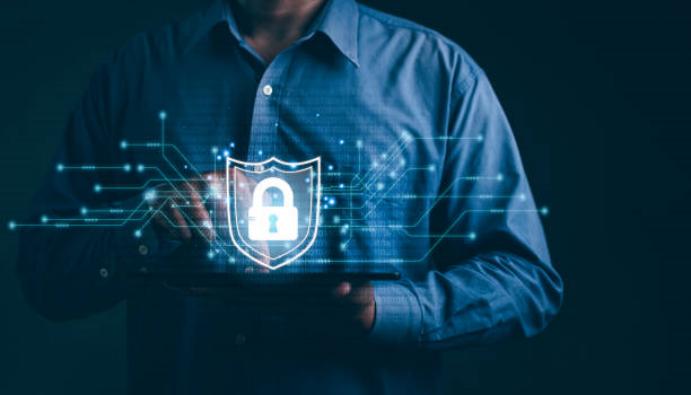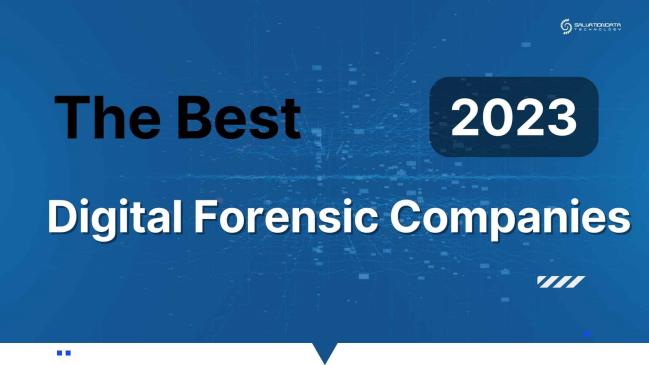Unveiling the Role of a Digital Forensics Expert in Modern Cybersecurity

-
Content
- What Is a Digital Forensics Expert?
- What Are the Responsibilities of A Digital Forensics Expert?
- What Skills Do Digital Forensics Experts Need to Master?
- What Is the Career Path of a Digital Forensics Expert?
- How to Be a Professional Digital Forensics Expert?
- Summary
-
Content
- What Is a Digital Forensics Expert?
- What Are the Responsibilities of A Digital Forensics Expert?
- What Skills Do Digital Forensics Experts Need to Master?
- What Is the Career Path of a Digital Forensics Expert?
- How to Be a Professional Digital Forensics Expert?
- Summary
What Is a Digital Forensics Expert?
In an era where digital traces are left by every click, download, and transaction, how can we navigate this massive maze of data to get the evidence we need? Step into the world of a digital forensics expert.
An specialist in digital forensics is comparable to a contemporary digital detective. They are experts at locating, protecting, deciphering, and showcasing electronic evidence. Digital forensics digs deep into the binary code to extract digital evidence from gadgets like computers, smartphones, and even cloud storage, whereas traditional forensics concentrates on physical traces. In our technologically driven day, these professionals are indispensable in resolving a wide range of problems, from fraud and cybercrimes to internal company inquiries. Their capacity to translate the complicated digital language not only helps catch offenders, but it also protects confidential information and upholds organizational integrity. By essentially bridging the gap between technology and the law, a digital forensics specialist makes sure that no bit of information is overlooked in the search for the truth.
What Are the Responsibilities of A Digital Forensics Expert?
1. Evidence Collection and Preservation
The first step is to locate possible electronic evidence sources. The device might be a portable one, a desktop, or a server. Adherence to appropriate processes for data collecting guarantees that no information is changed, erased, or exposed. To ensure that the original data is not altered, this also entails producing an identical copy of the data, or forensic image.
2. Digital Data Analysis
After the data is extracted, a digital forensics analyst dives deep into the bits and bytes. They employ specialized digital forensics software to sift through vast amounts of data, searching for deleted, encrypted, or hidden files that may serve as evidence.
3. Reporting and Testimony
After finishing their investigation, the expert writes up a comprehensive report explaining their findings. In instances where the evidence is to be presented in court, the digital forensics expert witness plays a crucial role, breaking down complex digital jargon for the court, and substantiating the validity of the evidence.
4. Continuous Learning and Training
The online world is always developing in new ways. Every day, new cyber dangers, tools, and applications are released. A digital forensics investigator must continually update their skills, familiarize themselves with the latest digital forensics software, and stay abreast of current cybercrime trends.
5. Collaboration with Other Professionals
Investigations frequently need for a comprehensive strategy that takes into account several angles. As a result, a digital forensics specialist could collaborate with other experts including attorneys, IT workers, and police to conduct a thorough investigation.
6. Ethical Considerations
Working with sensitive data requires impeccable ethical standards. Maintaining confidentiality, integrity, and avoiding any form of bias is paramount for a computer forensics analyst.
The importance of these specialists in our increasingly digitalized society is shown by the breadth and depth of their duties in the rapidly evolving field of digital forensics.
What Skills Do Digital Forensics Experts Need to Master?
Being an expert in digital forensics is not a small accomplishment. It demands more than just technical skill; it also calls for a combination of analytical ability, painstaking attention to detail, and a relentless search for the truth. Let’s examine the critical abilities and subject areas that these contemporary digital investigators need to be proficient in:
1. Technical Proficiency
Central to the role, an expert should be adept in operating various digital forensics software and dfir tools. They should have a deep understanding of file systems, storage media, network protocols, and how data is stored, transmitted, and deleted.
2. Cybersecurity Knowledge
Understanding the most recent malware, viruses, hacker methods, and cyber threats is essential. This helps the expert in digital forensics to identify odd trends and possible dangers.
3. Analytical Thinking
It is vital to have analytical and critical thinking skills. Given the massive amounts of data, it takes keen analytical abilities to separate pertinent information from noise.
4. Legal Acumen
An in-depth knowledge of the rules governing digital evidence, privacy rights, and electronic crimes is necessary since their conclusions frequently play a crucial part in court proceedings. This understanding guarantees the admissibility of the gathered evidence in court.
5. Communication Skills
Having the capacity to explain complicated technical terms in an easy-to-understand way is essential when writing a thorough report or providing expert testimony in the field of digital forensics.
6. Ethical Integrity
Managing sensitive information is a common aspect of the work. Maintaining confidentiality and adhering to ethical norms are unavoidable.
7. Problem-Solving Abilities
In this field, challenges are inevitable. Problem-solving abilities are essential for tasks like file decryption and tracking down complex cyberattacks.
8. Continuous Learning
The digital world is in constant flux. An appetite for continuous learning and staying updated with technological advancements, especially the offerings of digital forensics companies or cyber forensics companies, is vital.
9. Team Collaboration
Effective collaboration and strong interpersonal skills are essential for ensuring a well-rounded and well-coordinated inquiry, especially when working in tandem with a team.
An expert in digital forensics who has mastered these techniques will be in high demand as a bridge between the worlds of technology and law.
What Is the Career Path of a Digital Forensics Expert?
A digital forensics professional’s job path is subject to the same fast changes as the digital world. The range of roles offered, the high salary, and the quick rate of change in the industry make for a challenging yet rewarding career path. Let us examine the trajectory of their professional lives:
1. Entry-Level Positions
Upon obtaining relevant qualifications and certifications, budding professionals often start as digital forensics analysts or computer forensics analysts. Data gathering, preliminary analysis, and familiarity with digital forensic tools are their key responsibilities at the moment.
2. Specialized Roles
With experience, one can specialize in niches like mobile forensics, network forensics or cloud forensics. There’s also the role of a digital forensics investigator, which demands proactive sleuthing to preempt potential cyber threats.
3. Consultancy & Expert Witness
Experienced specialists frequently offer advisory services to businesses, assisting them in strengthening their digital infrastructure. Their knowledge might also be called upon to support digital evidence in court as a digital forensics expert witness.
4. Salary Prospect
In this sector, the salary is in line with how important the position is. Competitive benefits packages are often available for entry-level jobs, and as one acquires expertise and specialization, there may be room for significant advancement. Six-figure wages are sometimes required for senior posts, particularly in reputable digital forensics organization.
5. Expanding Job Opportunities
The need for specialists in this field has increased due to the growing dependence on digital platforms and the corresponding growth in cybercrimes. Prospects are abundant not just in the field of digital forensics services but also in industries such as e-commerce, finance, and defence.
6. Entrepreneurial Ventures
Starting your own digital forensics business is a great opportunity for those with an entrepreneurial spirit to provide specialized services and solutions along with financial benefits and difficulties.
In a nutshell, a career in digital forensics is one of never-ending education, shifting responsibilities, and the deep fulfillment that comes from protecting the digital world. It’s a rewarding career option for people interested in technology and social justice.
How to Be a Professional Digital Forensics Expert?
Becoming a digital forensics specialist requires more than just adopting technology, it also requires a dedication to quality, morality, and ongoing development. an is a thorough tutorial on how to become a top-tier professional in an ever-evolving area.
1. Solid Educational Foundation
Specialized courses and degrees focused on digital forensics provide a more customized basis, even though a background in IT, cybersecurity, or computer science is helpful. The first step is to have a deeper grasp of operating systems, computer networks, and cyber legislation.
2. Acquire Certifications
Professional certifications amplify credibility and expertise. Some revered ones include Certified Computer Examiner (CCE), Certified Forensic Computer Examiner (CFCE), and Certified Cyber Forensics Professional (CCFP).
3. Hands-on Training
While being well-versed in theory is important, the real meat of this career is done in the field. Practise what you’ve learned in the lab, in simulations and in actual situations. Gaining experience working under a seasoned expert may be a priceless learning opportunity.
4. Practical Experience
Work for a digital forensics company or law enforcement to obtain experience. Real-world experience improves abilities and deepens comprehension of digital investigations.
5. Ethical Vigilance
When working with private information, honesty and reliability are essential qualities to possess. Strict ethical standards, privacy protection, and strict secrecy must always be upheld.
6. Continuous Learning
The internet evolves. Frequent updates on cyber security, digital forensics software, and other important issues. Seminars, conferences, and workshops provide useful knowledge.
7. Networking
Participate in the digital forensics community by building your network and joining professional organizations. Developing your network may lead to new business opportunities, the exchange of valuable information, and even a promotion at work.
8. Ethical and Legal Courses
Attend legal implications of digital investigations courses on a regular basis. This guarantees that the procedures you follow comply with the latest laws and regulations.
Becoming a digital forensics specialist requires perseverance, agility, and a need for information. By following these principles and adopting a development attitude, one may excel in this vital field. In our next section, we’ll discuss these professionals’ digital problems.
Summary
Digital forensics experts play a crucial role in our environment, which is quickly becoming more digital. These experts serve as the link between technology and justice, protecting digital integrity. They are more than simply tech enthusiasts. Their importance is indisputable, ranging from comprehending the wide range of digital forensics to the diverse duties they do. Their career path presents a range of obstacles and benefits, with possibilities for varied experiences, ongoing education, and the possibility of significant career advancement. A strong foundation in ethics, practical experience, education, and credentials are essential for success as an expert in this field. In an environment where digital traces may be both beneficial and dangerous, professionals in digital forensics act as watchful guardians, preserving information, revealing the truth, and making sure that the digital domain stays a positive force. As we move forward into a time where technology is still influencing every aspect of our lives, these professionals’ roles will only become more crucial, confirming their status as essential cornerstones of the contemporary world.




